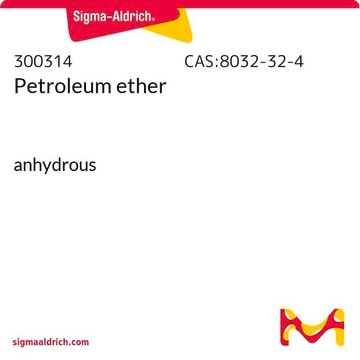1.01770
Petroleum benzine boiling range 100-140°C
(naphtha benzine) EMPLURA®
Synonym(s):
Petroleum ether, Petroleum spirit, Petroleum ether
About This Item
Recommended Products
vapor pressure
30-40 hPa ( 20 °C)
Quality Level
product line
EMPLURA®
autoignition temp.
250 °C
expl. lim.
0.8-6.5 % (v/v)
impurities
≤0.0005% Free acid (as CH3COOH)
≤0.01% Water
≤0.05% Aromatics (as toluol)
evapn. residue
≤0.005%
kinematic viscosity
0.76 cSt(25 °C)
bp
107-137 °C/1013 hPa
transition temp
flash point <-10 °C
density
0.728 g/cm3 at 15 °C
storage temp.
2-30°C
Looking for similar products? Visit Product Comparison Guide
General description
Application
- Ginkgo Biloba L. Exocarp Extracts: Utilizing petroleum benzine for solvent extraction, this research explores the anti-microbial potential of Ginkgo biloba L. exocarp extracts against methicillin-resistant Staphylococcus aureus, indicating its significant role in pharmaceutical applications (Wei et al., 2024).
- Creating Mesopores in ZSM-5 Catalyst for Aromatics Production: This application of petroleum benzine in the synthesis of biodiesel-derived waste glycerol showcases innovative use in catalytic processes to enhance aromatic production, beneficial for both environmental and industrial chemistry (Kumar et al., 2024).
- High-Speed Countercurrent Chromatography for Bioactive Neolignan Isomers: Demonstrating the use of petroleum benzine in chromatographic techniques, this method significantly aids in the isolation of complex organic compounds, crucial for advanced research in natural product chemistry (Xiao et al., 2024).
- Hydrocarbon Ingestions and Poison Control: While indirectly related, the study uses data on hydrocarbon ingestions to emphasize the importance of safety and environmental impact assessments in the use of petroleum products, including benzine, within public health contexts (Palmer et al., 2023).
Analysis Note
Boiling range (lower value): ≥ 100.0 °C
Boiling range (upper value): ≤ 140.0 °C
Density (d 20 °C/ 4 °C): 0.720 - 0.733
Aromatics (as toluol): ≤ 0.05 %
Readily carbonizable substances: conforms
Evaporation residue: ≤ 0.005 %
Water: ≤ 0.01 %
Legal Information
Signal Word
Danger
Hazard Statements
Precautionary Statements
Hazard Classifications
Aquatic Chronic 2 - Asp. Tox. 1 - Flam. Liq. 2 - Skin Irrit. 2 - STOT SE 3
Target Organs
Central nervous system
Storage Class Code
3 - Flammable liquids
WGK
WGK 2
Flash Point(F)
24.8 °F - closed cup
Flash Point(C)
-4 °C - closed cup
Certificates of Analysis (COA)
Search for Certificates of Analysis (COA) by entering the products Lot/Batch Number. Lot and Batch Numbers can be found on a product’s label following the words ‘Lot’ or ‘Batch’.
Already Own This Product?
Find documentation for the products that you have recently purchased in the Document Library.
Customers Also Viewed
Our team of scientists has experience in all areas of research including Life Science, Material Science, Chemical Synthesis, Chromatography, Analytical and many others.
Contact Technical Service









